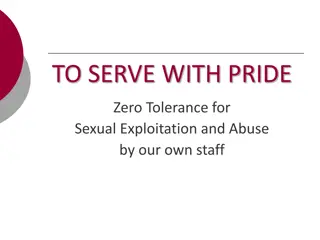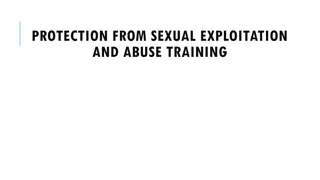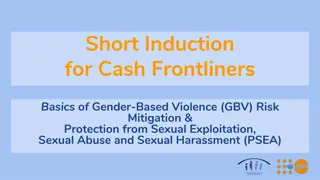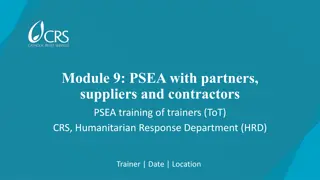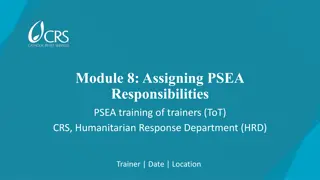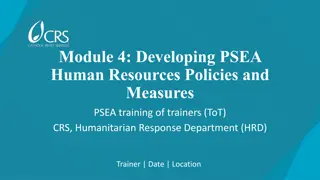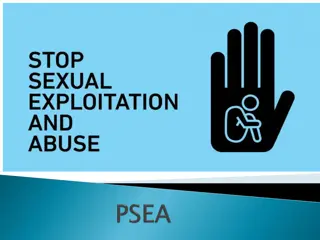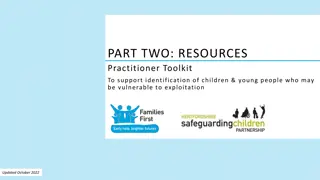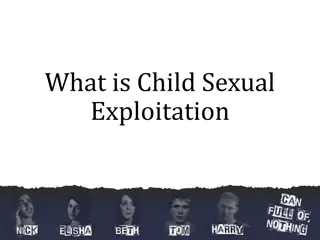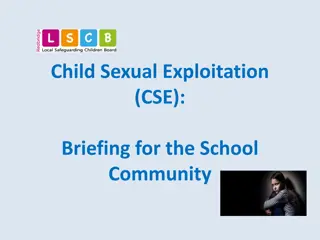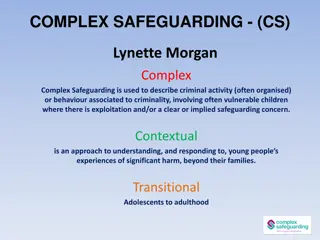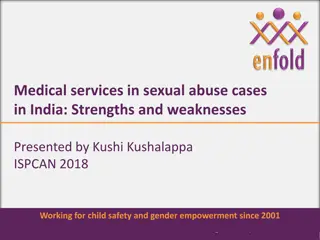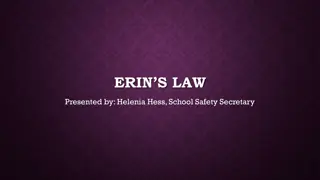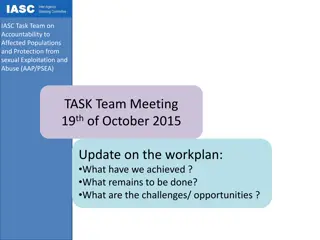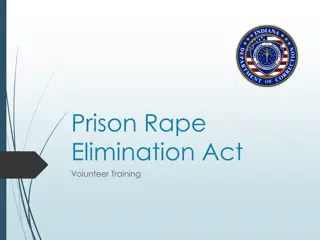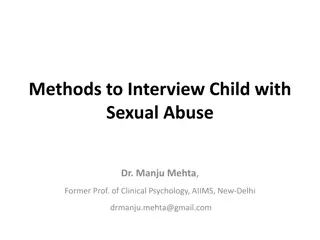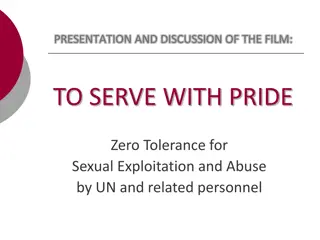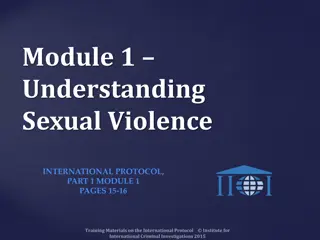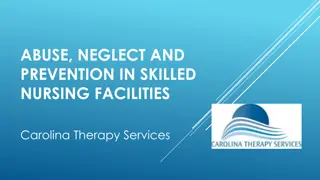Protection from Sexual Exploitation and Abuse (PSEA) in COVID-19 Response
Amid the COVID-19 crisis, the risks of Sexual Exploitation and Abuse (SEA) are heightened, impacting vulnerable populations. It is crucial for humanitarian actors to uphold existing PSEA commitments and systems. SEA violates fundamental human rights, undermines trust, and has severe consequences for individuals and communities. The definition of SEA includes any exploitation of vulnerability for sexual purposes. There is a zero-tolerance policy towards SEA for personnel engaged in aid work.
Download Presentation

Please find below an Image/Link to download the presentation.
The content on the website is provided AS IS for your information and personal use only. It may not be sold, licensed, or shared on other websites without obtaining consent from the author.If you encounter any issues during the download, it is possible that the publisher has removed the file from their server.
You are allowed to download the files provided on this website for personal or commercial use, subject to the condition that they are used lawfully. All files are the property of their respective owners.
The content on the website is provided AS IS for your information and personal use only. It may not be sold, licensed, or shared on other websites without obtaining consent from the author.
E N D
Presentation Transcript
1 Protection from SEA during the COVID-19 response 1
COVID 19 crisis..A time of heightened risk due to Disruptions to livelihoods Social isolation Compromised community-based complaints and reporting channels and decreased access to information Weakened referral pathways and services Surge in new responders These risks are particularly apparent for already vulnerable populations 2
However, COVID-19 doesnt create new responsibilities for PSEA. Actions during the pandemic should strengthen existing PSEA commitments and systems. Humanitarian actors have a critical role to play at all levels. 3
PSEA DEFINITION .. Recap Protection from Sexual Exploitation and Abuse (PSEA) 4
WHAT IS SEA? Sexual Exploitation and Abuse (SEA) is a term used to describe inappropriate sexual conduct perpetrated by aid workers against recipients of assistance and other members of vulnerable communities. 5
WHAT IS SEA? SEA violates fundamental human rights and is a betrayal of the core values of the United Nations. SEA undermines the effectiveness of the United Nation s work and the trust of the most vulnerable populations we are mandated to protect. SEA has serious consequences for the individuals and 6 communities affected. SEA harms victims physically,
DEFINITION OF SEA Sexual exploitation means any actual or attempted abuse of a position of vulnerability, differential power, or trust, for sexual purposes, including, but not limited to, profiting monetarily, socially or politically from the sexual exploitation of another. 7
PROHIBITION OF SEA IP employees, agents or any other persons engaged by the IP, including subcontractors( IP personnel ) are prohibited from engaging in SEA. ZERO TOLERANCE: IP acknowledges and agrees that they should apply zero tolerance with regard to SEA by IP personnel. Possible Perpetrators : All IP Personnel 8
Core Principles of SEA Sexual exploitation and abuse by humanitarian workers constitute acts of gross misconduct and are therefore grounds for termination of employment. Sexual activity with children(under the age of 18) regardless of local laws or standards. Mistaken belief regarding the age of a child is not a defense! Exchange of money, employment, goods, or services for sex, including sexual favors or other forms of humiliating, degrading or exploitative 9 behavior.
Cont Any sexual relationship between those providing humanitarian assistance and protection and a person benefitting from such humanitarian assistance and protection that involves improper use of rank or position is prohibited. Such relationships undermine the credibility and integrity of humanitarian aid work. Where a humanitarian worker develops concerns or suspicions regarding sexual abuse or exploitation by a fellow worker, whether in the same 10 agency or not, he or she must report such concerns via established
OBLIGATIONS OF Partners Prevent Report Assist the survivors 11
PSEA IASC Interim Guidance-COVID 19 The COVID-19 Pandemic is a public health, social and economic crisis that is global in scale. With restrictions on travel and movement, civil society and humanitarian organizations play a critical role in supporting governments to respond. All people should remain safe from sexual exploitation and abuse while receiving humanitarian aid, including health services and treatment, without abuse or exploitation. If sexual exploitation or abuse does occur they should have access to 13 safe and confidential reporting channels and services.
Some Recommendations Reducing Risks Prevention Reporting Support & Protection Coordination Designate PSEA FP Circulate PSEA Codes Establish/strengthen Train PSEA FPs on Identify FPs in service Examine & mitigate of Conduct complaint channels & referral pathways provision structures Develop key Ensure functioning of Define roles and risks in healthcare disseminate info Consult affected delivery settings as messages on PSEA referral pathways responsibilities for all Ensure community well as GBV service and Disseminate key communities on actors within provision points messages to affected alternatives to in- sensitization on how interagency PSEA Implement risk communities person complaint to report structure Strengthen Support the Ask for remote mitigation measures in quarantine facilities leadership of women strengthening of the support where (e.g. shelters, etc) and girls in decision national help lines needed making 5600 14
Priorities for Ensuring PSEA in COVID 19 response: 1. Need to designate Focal points and ensure that these are working and can be reached, with a clear back-up system in place; 2. Continued collaboration among humanitarian actors to ensure reporting- and complaints mechanisms are functional and accessible; 3. Referral services for victims are available and updated as necessary; 4. PSEA is integrated in all COVID-19 guidance, response- and work-plans; 5. New personnel and partners are aware of the standards of conduct expected; and have received training on PSEA.- online 15
PSEA During the COVID-19 Response: Strengthening of inter agency PSEA network and reviving the in country PSEA network Facilitate good practices in information sharing between organisations - responsible collection, handling, referral and investigation of SEA allegations, as well as feedback and timely reporting. Supporting the Toll-Free Line for Reporting of SEA: Dissemination of related PSEA and COVID 19 resources with partners thru the protection cluster and HCT members-highlighting the importance of PSEA during the COVID-19 pandemic and stressing the high-level priorities as outlined in the IASC technical guidance
PSEA During the COVID-19 Response: possible activities Survivor Assistance: Strengthening GBV service provision for survivors: shift/adapt their service provision to remote and/or mobile and flexible approaches Integrate reporting channels for SEA into GBV referral pathways Staff training and orientation: Sharing of online training platforms Incorporation PSEA messages into harmonized COVID-19 and GBV prevention/response awareness messages focusing on reporting channels, GBV service availability, referral pathways; and translate into local languages; 17
THANK YOU FOR YOUR ATTENTION 18


